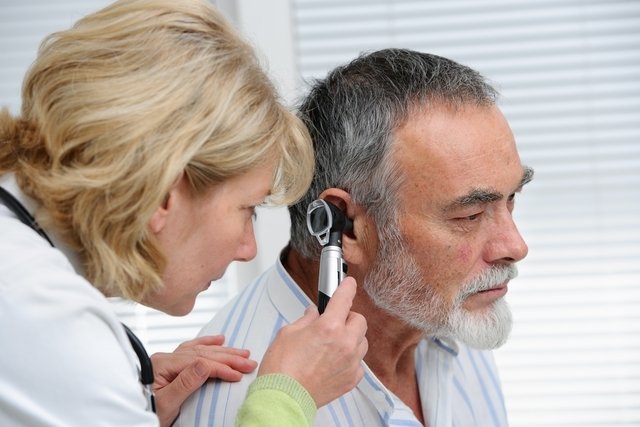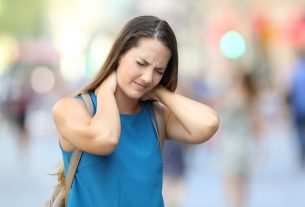Treatment for labyrinthitis typically involves drinking fluids, rest, and the use of antiemetic and antihistamine medications. However, depending on the cause of labyrinthitis, antibiotics, corticosteroids and even surgery may be indicated.
Labyrinthitis is usually caused by inflammation of a part of the ear, called the labyrinth, due to viral infections such as colds. However, it can also be caused by more serious diseases such as acute otitis media and meningitis, for example. Understand better what labyrinthitis is.
If labyrinthitis is suspected, it is recommended to consult an otorhinolaryngologist or general practitioner to confirm the diagnosis, identify the cause and initiate the most appropriate treatment.

Treatment options for labyrinthitis
The main treatment options for labyrinthitis are:
1. Remedies for labyrinthitis
The most recommended remedies for labyrinthitis are:
- Antibiotics: are normally indicated when the cause of labyrinthitis is a bacterial infection. In more serious cases, treatment may need to be carried out with the person admitted to the hospital and with the injection of antibiotics into the vein;
- Antihistaminessuch as promethazine (Phenergan) or dimenhydrate (Dramin): may be indicated to relieve dizziness and nausea;
- Benzodiazepines: although less recommended, medications such as diazepam may be indicated to relieve dizziness in some cases. Normally, they are not indicated for more than 3 days;
- Antiemeticssuch as prochlorperazine and betahistine dihydrochloride: may be indicated to relieve nausea and vomiting during a labyrinthitis crisis;
- Corticosteroids: may be indicated to reduce inflammation in the ear and alleviate symptoms when labyrinthitis is caused by some diseases that affect the immune system.
These medicines should not be used without medical advice. Furthermore, although some are indicated to alleviate symptoms, others should only be used after identifying the cause of labyrinthitis. See other remedies for labyrinthitis.
2. Home care
Drinking enough fluids and resting, avoiding tasks that require balance or walking a lot, for example, are important to avoid dehydration and the person from injuring themselves due to dizziness during the labyrinthitis crisis.
Furthermore, it is also important to have an adequate diet, rich in foods with fiber, anti-inflammatory and antioxidant nutrients, such as tangerines, oranges and papaya. See what the diet should be like in case of labyrinthitis.
3. Physical therapy for labyrinthitis
Physical therapy for labyrinthitis, known as vestibular rehabilitation therapy, is usually recommended in cases where some symptoms, such as dizziness and difficulty with balance, persist.
During therapy, the physiotherapist usually guides head and eye movement exercises in different positions, to help the nervous system compensate for the abnormal signals received from the ear, accelerating recovery from symptoms.
4. Home remedies
Some teas, such as ginger tea or ginkgo biloba, stimulate blood circulation to the ear and have antiemetic properties. They can be useful for relieving symptoms, such as nausea and dizziness, and are recommended to complete treatment advised by your doctor. See more natural treatment options for labyrinthitis and how to prepare.
5. Surgery
Although rare, surgery may be indicated in some cases in the treatment of labyrinthitis, such as when it is caused by acute otitis media with accumulation of secretion in the ear, cholesteatoma and severe mastoiditis.
Bibliography
- DOMMARAJU, Sindhu; PERERA, Eshini. An approach to vertigo in general practice. Aust Fam Physician. Vol.45, n.4. 190-194, 2016
- STATPEARLS. Labyrinthitis. 2022. Available at: <https://www.ncbi.nlm.nih.gov/books/NBK560506/>. Accessed on 06 Dec 2022
- KIM, Hyo-Jung; PARK, JaeHan; KIM, Ji-Soo. Update on benign paroxysmal positional vertigo. J Neurol. Vol.268, n.5. 1995–2000, 2021

Sign up for our newsletter and stay up to date with exclusive news
that can transform your routine!
Warning: Undefined array key "title" in /home/storelat/public_html/wp-content/plugins/link-whisper-premium/templates/frontend/related-posts.php on line 12
Warning: Undefined array key "title_tag" in /home/storelat/public_html/wp-content/plugins/link-whisper-premium/templates/frontend/related-posts.php on line 13




